Acne in Men: Causes of Adult Acne, Prevention, & Treatment
Last updated April 3, 2023
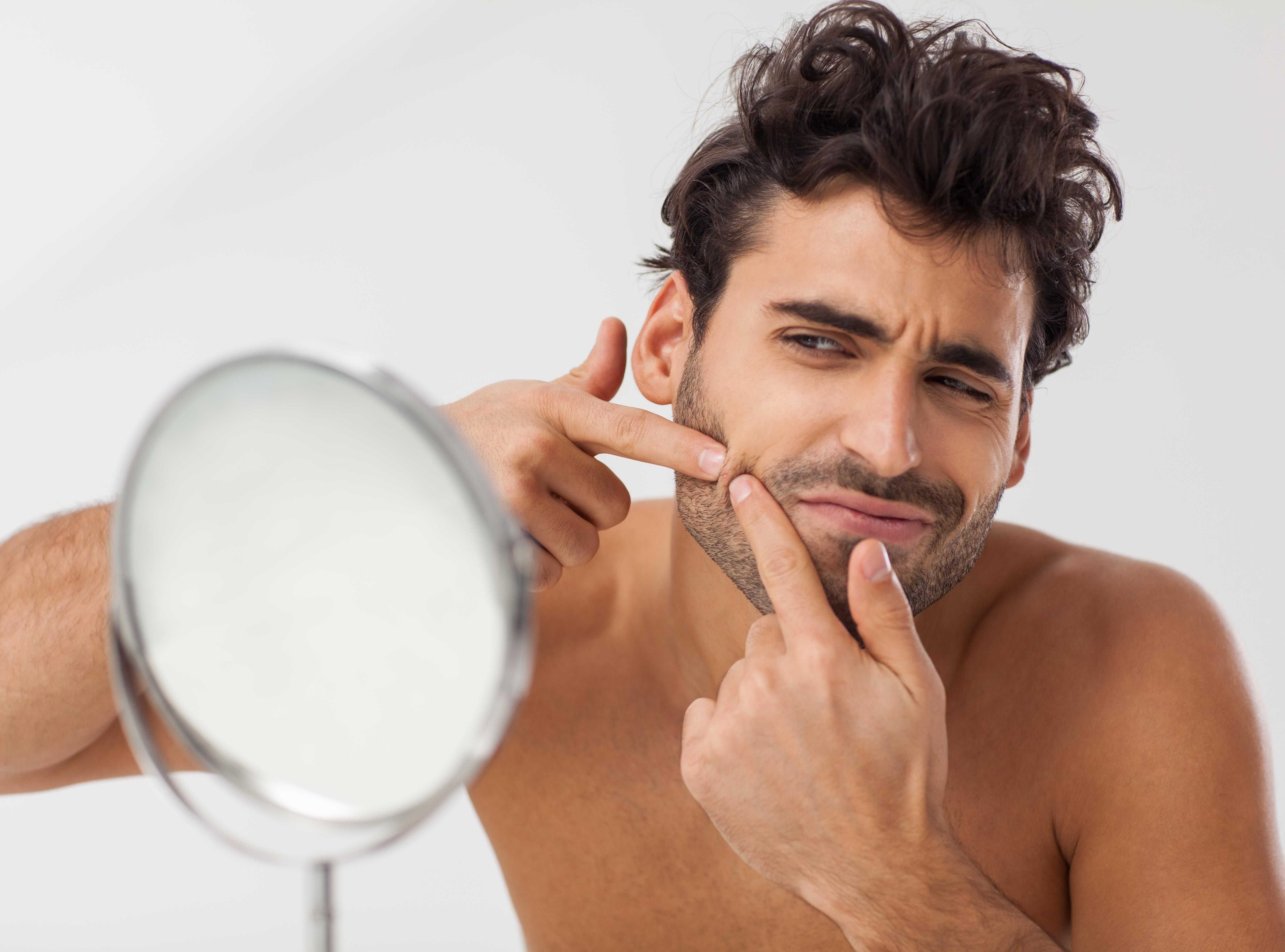
Even for men, acne is a genuine problem. There's no denying that men with oily skin have a wonderful glow on their faces, but that glow can sometimes lead to blocked pores and adult acne.
Acne is actually an inflammatory condition of the pilosebaceous units, which are the hair follicles and oil glands in our skin. When these units get clogged, it can lead to those pesky pimples that we all know and hate.
Researchers have shown that 9.4 percent of the global population suffers from acne. According to the American Academy of Dermatology (AAD), acne is the most prevalent skin problem in the country.
Acne can also be hard to deal with. Men's acne is most common on the face, although it can also appear on the chest, shoulders, and back (known as "bacne").
Some men have acne-like lumps after shaving, but these are actually ingrown hairs or razor burns. So, men need to know the difference between the two and get the information they need to treat acne properly.
The good news is that there is a lot you can do to treat acne, whether you've suffered from it your whole life or are just now seeing blemishes appear. This article will discuss the causes, prevention, and treatment of acne in men. It will act as an all-inclusive guide for dealing with and avoiding male acne.
Let's jump right in!
Causes of Acne in Men
It's likely that if you can identify the root causes of your acne, you'll be able to treat it more effectively. While fluctuating female hormones may be to blame for acne in some women, men can identify other causes, such as:
Hormonal changes during adolescence and adulthood
Puberty can cause an increase in the production of sebum, the oily substance that can clog pores and cause acne. This explains why teenagers have a higher incidence of acne.
In addition, the male hormone testosterone produces a higher concentration than female hormone, resulting in thicker, oily skin. Sebum, or oils, also increases in men as testosterone increases, leading to blocked pores and acne breakouts.
Genetics
Acne tends to run in families, so being born into an acne-prone family increases your risk of developing acne. If a man's father suffered from severe acne, that man is more likely to develop acne himself.
Certain medications
Men who take medications that affect their testosterone levels may see an increase in acne. Your hormone levels will shift, and you may break out if you take lithium or corticosteroids. Lithium, used to treat bipolar disorder, and corticosteroids like prednisone have both been linked to an increase in acne.
Bacteria and clogged pores
Most of the time, acne is caused by bacteria. Because these hormones lead to excess oil production, pores can get clogged, which makes it easy for bacteria to grow. Even though sweating isn't directly linked to adult acne, it can cause breakouts if it catches dirt and oil and makes your pores swell if you don't wash your face frequently enough. Both of these problems cause pimples.
Environmental factors
Polluted air can block your pores and cause acne. Acne can also be triggered by the overproduction of oil by the skin in response to hot and humid conditions.
PRO TIP: You should consult a dermatologist to try to "connect the dots" and find out what's causing your acne. It could be an adverse reaction to a medicine you're taking for a known or unknown health problem.
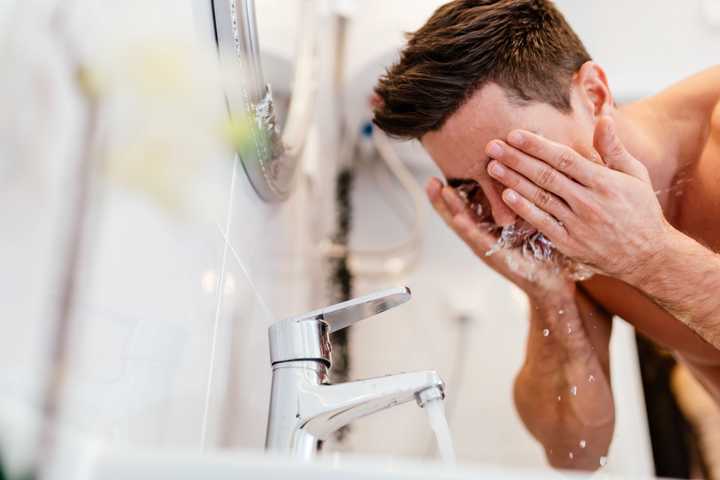
Prevention of Acne
Men can avoid getting acne by sticking to a skincare routine, avoiding certain triggers, and making other lifestyle changes. Let's look at some of these in detail:
Proper skincare routine
Just like we hinted earlier, a dirty face is not the root cause of acne. However, if you're having trouble with your acne treatments, a solid skincare routine can help. You need to be willing to invest the time, stay disciplined in your routine, and select the best possible products to treat your skin.
An excellent skincare routine should comprise the following:
- Cleanse: Use a mild cleanser to remove dirt, oil, and makeup.
- Tone: Use a toner to bring your skin's pH level back to normal and get rid of any remaining dirt or oil.
- Exfoliate: Using an exfoliating product can help remove dead skin cells and increases cell turnover.
- Treat: Use a serum or spot acne treatment if you have a problem like stubborn acne or wrinkles.
- Moisturize: Apply a daily moisturizer to keep your skin supple and healthy, both in the morning and before bed.
- Sun Protection: Use sunscreen with a proper SPF to protect your skin from the sun's UV rays.
Don't forget, consistency and the right products matter. Refer to our ultimate skin care routine article for additional details and recommendations on the establishing the right routine.
Avoiding certain triggers
- Certain foods
According to the American Academy of Dermatology, foods with a high glycemic index may increase the risk of developing acne or make acne worse. Eating less sugar, dairy, and carbs might be good, but you should talk to your doctor before making any significant changes to your diet.
- Stress
The development of adult acne, which affects men, can be influenced by adult lifestyle choices, including stress and grooming practices. Stress can lead to a rise in hormone levels that might result in acne.
- Using the wrong skincare products
Improper skincare products can cause acne due to the presence of irritating and pore-blocking substances. Acne can also be caused by using products that aren't suited to your skin type, such as oil-based products on oily skin or harsh products on sensitive skin.
Wearing non-comedogenic makeup and sunscreens
Your skin type should guide your selection of skincare products. Products labeled "oil-free" or "non-comedogenic" are ideal for those with acne-prone skin because they won't clog pores. Products with fragrances can irritate and dry out delicate skin, so it's best to stick to milder, "fragrance-free" options. But be careful with "unscented" cosmetics since many of them have perfumes that cover up the smell but can still irritate your skin.
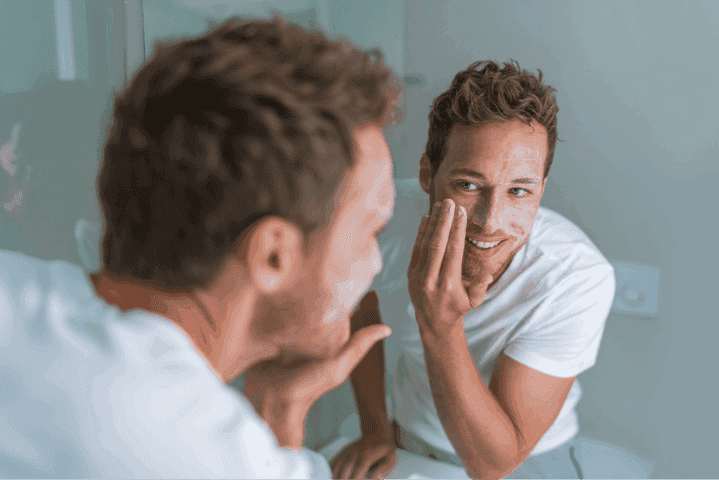
Treatments for Acne
Acne treatment for men can be a difficult task, especially for those with acne-prone skin. You might not be able to swerve it entirely, but if acne breakouts occur, you can take some immediate steps to soothe your symptoms.
Over-the-counter options
- Topical creams and gels
Dermatologists recommend topical retinoids containing vitamin A-derived medications as a common acne treatment and preventative measure. Because of these treatments, the skin's natural process of shedding and renewing itself happens more quickly. This means that there is less buildup of dead skin and fewer clogged pores.
Topical retinoids like tazarotene and tretinoin (Retin-A, Renova) can only be bought with a prescription. However, adapalene (Differin) and other topical retinoids are sold without a prescription and can serve as effective acne spot treatments.
- Oral medications
Acne is often treated with a variety of oral medicines. To lower the number of bacteria on the skin, tetracyclines (such as doxycycline and minocycline) and macrolides (such as erythromycin) are often used.
These drugs have potential adverse effects and precautions that should be discussed with a doctor before use. The most effective acne treatment for men will differ from person to person and from acne type to acne type.
Prescription medications
Most topical acne treatments contain retinoids or antimicrobials like benzoyl peroxide or antibiotics. These therapies are effective in the treatment areas and can stop the development of new infections or a
- Topical and oral antibiotics Acne is typically treated with topical or oral antibiotics prescribed by a dermatologist when oral or topical treatments fail to control the condition.
Antibacterial and anti-inflammatory in one, clindamycin is widely used as a prescription topical. Together with benzoyl peroxide and topical retinoids, it is a common prescription for acne treatment.
In cases of severe acne, oral antibiotics can be used to treat the condition systemically by eliminating the bacteria that cause inflammation and the formation of pimples and cysts inside blocked pores.
The following are examples of common oral antibiotics used to treat acne in men:
- Tetracycline
- Doxycycline
- Azithromycin
- Retinoids The majority of topical acne treatments contain retinoids or antimicrobials like benzoyl peroxide or antibiotics. These therapies work to stop new lesions from forming where they are applied. Vitamin A-derived retinoids often treat acne symptoms like whiteheads, blackheads, and pimples. They also work well to counteract hyperpigmentation and the effects of age.
Examples of typical retinoids are:
- Tretinoin, the most widely used retinoid, is effective in reducing the appearance of acne scars and promoting the development of new skin cells.
- Retinol, a moderate retinoid used to treat acne when mixed with other substances, is most effective at reducing the effects of age.
- Adapalene is a retinoid that can be purchased without a prescription in modest doses and typically has less severe side effects. When it comes to face products for oily skin and mild acne, many people turn to over-the-counter (OTC) options like retinol and adapalene rather than the prescription drug tretinoin.
- Isotretinoin Isotretinoin affects all of the things that cause acne: it changes abnormal follicular keratinization, cuts sebum production by 70%, stops P. acnes from taking over the skin, and reduces inflammation. Isotretinoin is a strong oral retinoid used to treat severe cystic and nodule-producing acne that hasn't responded well to prior treatments.
A board-certified dermatologist monitors men who use isotretinoin because it can cause several side effects.
Lifestyle changes
- Diet and exercise Diet and exercise can help clear up acne. If you eat a lot of fruits and vegetables, lean proteins, and healthy fats and stay away from processed foods, sugar, and dairy, you can reduce inflammation in your body, making acne less severe.
Exercise, in particular, has been shown to lower stress, which can be a cause of acne. When we're under stress, our bodies release hormones that might boost oil production and make us more prone to breakouts.
- Stress management Stress management can be an essential part of treating acne. Hormones like cortisol, which are released in response to stress, can cause your skin to produce more oil, making you more prone to breakouts.
Stress and acne can be reduced with the help of some different stress management approaches. Some examples include: Exercise, Yoga, Meditation, Therapy, and Time management.
Get plenty of sleep, as sleep deprivation can both heighten emotional stress and worsen acne.
Professional treatments
- Chemical peels
This therapy is intended for mild acne. The chemical solution, which may be salicylic acid, glycolic acid, or retinoic acid, is applied multiple times over the course of treatment. Although it has the potential to make the skin seem better, the effects tend to stay relatively short, and more treatments are typically required.
Microdermabrasion With microdermabrasion, dead skin is gently scraped away with either tiny crystals or a wand coated in a thin layer of diamond. Furthermore, it helps improve the skin's tone and texture by increasing collagen formation.
Light therapy The use of light in therapy has been explored and has shown some promise. Medical professionals can perform photodynamic treatment by using a topical solution that increases the skin's sensitivity to light. After this, they'll employ a concentrated beam of light to treat the affected area. This can help get rid of germs and dead skin. You'll most likely need to see your doctor more than once.
Discussing treatment options with a dermatologist.
After several weeks of trying OTC (nonprescription) acne treatments without success, it may be time to consult your doctor about more potent prescription drugs. If your usual doctor hasn't been able to help you clear up your acne, a dermatologist may be the best person to do it. Dermatologists are medical experts that specialize in skincare.
In addition, the knowledge of a dermatologist is not just "skin deep." Acne can cause a person to feel embarrassed and ashamed, which is something they fully comprehend. And until your skin clears up, be sure to schedule three- to six-month checkups with your dermatologist.
Conclusion
Acne is frequent in adult men. It's not easy to acknowledge, but acne can make you feel less confident. It can make you feel bad about yourself, worried, and sad. Don't be so hard on yourself; you're not being vain or superficial. This is how a lot of people feel.
Although it can have a negative impact on self-esteem, acne is a common skin issue that you can treat with a variety of options, including both over-the-counter and prescription drugs.
With proper care, acne can be completely cured in almost all cases.
To that end, start some sort of treatment immediately. Just knowing that you can do something about your skin can give you a boost.
For mild acne, using over-the-counter facial washes with benzoyl peroxide and hydroxy acid as part of a regular skincare routine can help clear up and prevent acne symptoms. If you have severe acne that doesn't clear up with over-the-counter products, a doctor can prescribe topical and oral antibiotics or maybe an isotretinoin regimen to help clear up your skin.
Be Patient
Don't give up too soon; acne treatments take time to work. The skin is an organ that can withstand a lot, but it may also be very resistant to change. It could take up to four months for you to see a difference in your skin. Plan on sticking with a treatment for at least that long.
You should prepare yourself for the possibility of new acne breakouts during the first few weeks of treatment as your skin adjusts to the new regimen. This does not necessarily indicate that the treatment is ineffective. Give it some time, and consult your dermatologist if you have any concerns.
Our Top Picks
Best Face Wash for Acne Prone Skin: Lumin Charcoal Cleanser
Best Moisturizer for Acne Prone Skin: Geologie Moisturizing Face Cream with SPF15
Best Sunscreen for Acne Prone Skin: Jack Black Oil-Free Sun Guard SPF 45 Sunscreen
Best Face Wash for Acne Prone Skin: Lumin Charcoal Cleanser
Lumin's Charcoal Cleanser is perfect for men looking to cleanse their skin from excess dirt and oils, while maintaining a healthy complexion. This facial cleanser contains two key ingredients to provide maximum results: charcoal and rose flower oil. Charcoal helps with skin detox, removing impurities from the pores, giving you that deep-down clean you crave. Rose flower oil helps calm irritated skin and reduces puffiness. Lumin's gentle, yet effective formula won't strip your skin of its natural oils, leaving it feeling refreshed and balanced.
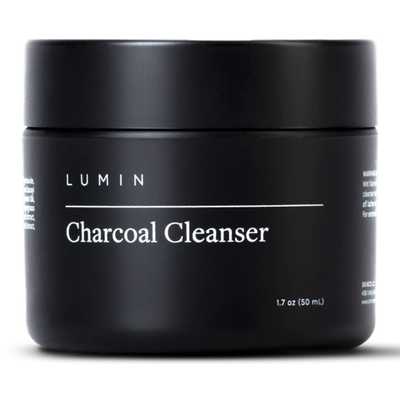
The "Good"
- Great for balancing oily skin
- Leaves skin feeling clean and refreshed.
The "Could Be Better"
- Packaging isn't a squeeze bottle or pump, making it a little tough to use.
Active Ingredients
Best Moisturizer for Acne Prone Skin: Geologie Moisturizing Face Cream with SPF15
Geologie Moisturizing Face Cream with SPF15 is a perfect addition to your daily skincare routine. This nourishing and hydrating moisturizer helps keep skin looking and feeling healthy while protecting against the sun's harmful rays. Made with Hyaluronic Acid and Niacinamide, it’s the right mix of active ingredients to do the job.
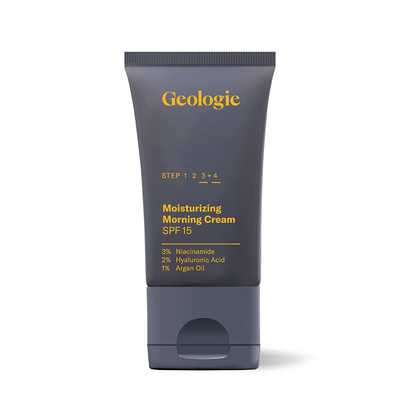
The "Good"
- Ocean Friendly SPF15
- Smooth application
The "Could Be Better"
- Price tag
Active Ingredients
Best Sunscreen for Acne Prone Skin: Jack Black Oil-Free Sun Guard SPF 45 Sunscreen
Jack Black’s Oil-Free Sun Guard sunscreen is packed with vitamins and offers sweat-proof UVA/UVB protection that stays put during active days in the sun. Its oil-free formula absorbs quickly, offering maximum protection without drying.
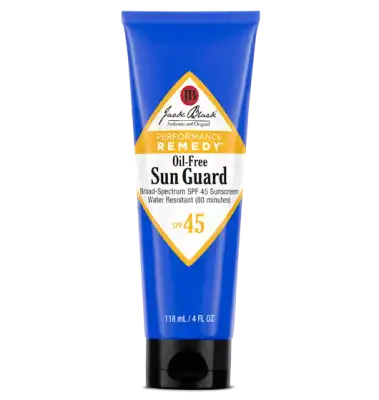
The "Good"
- Lightweight, non-greasy mineral formula.
- Absorbs quickly and leaves no white cast.
The "Could Be Better"
- Zinc Oxide may be more irritating to eyes than chemical sunscreen.